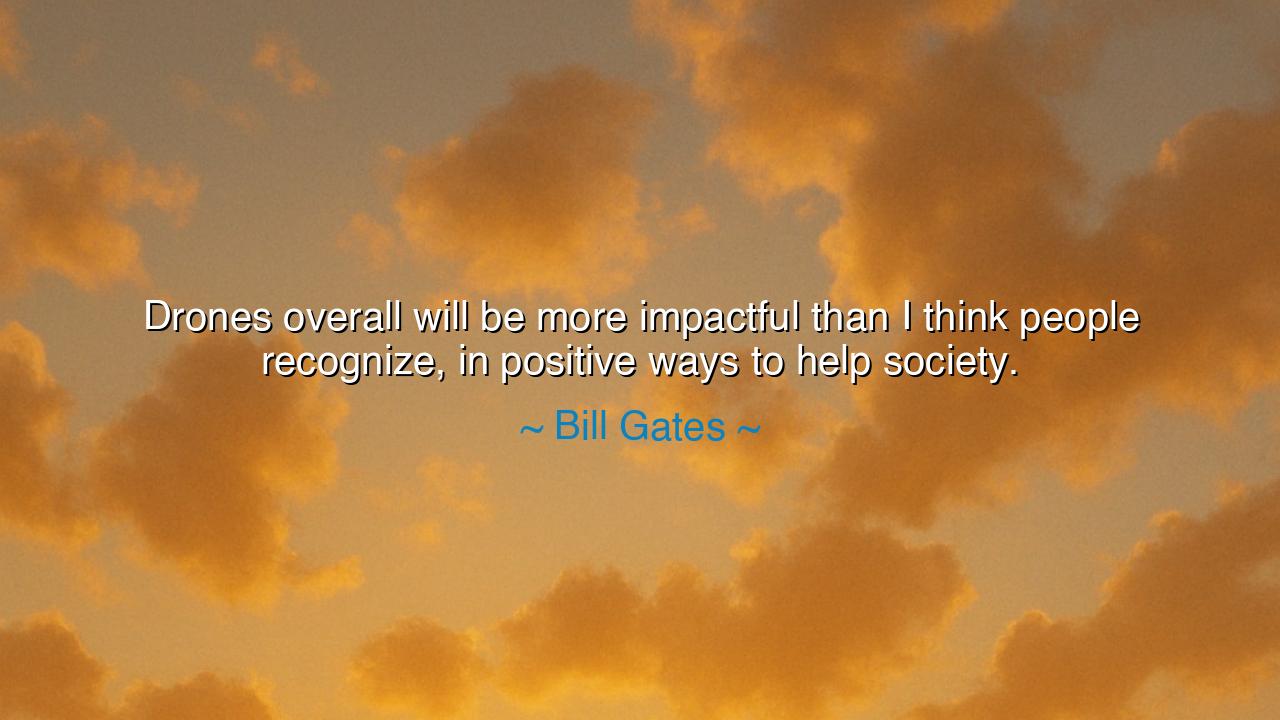
Drones overall will be more impactful than I think people
Drones overall will be more impactful than I think people recognize, in positive ways to help society.






Hear the words of Bill Gates, who has long seen the hidden paths of technology before others could imagine them: “Drones overall will be more impactful than I think people recognize, in positive ways to help society.” These words may sound like a simple forecast, yet they carry within them the seed of prophecy. For they speak not only of machines that fly, but of the destiny of human invention—tools once feared or doubted that later became saviors in times of need. Gates reminds us that what many see as toys, or even threats, may one day become pillars of life and safety for countless souls.
For what are drones but the latest children of human ingenuity—small vessels of air, carrying eyes, knowledge, and supplies into places where human hands cannot easily reach? In war, they are often feared, for they can strike unseen. But Gates calls us to see beyond destruction, to the positive side of their nature: that these winged machines may deliver medicine where no road exists, may survey crops to bring food where hunger reigns, may carry hope into deserts, mountains, and storms. To reject them out of fear is to ignore the truth that every invention holds the power for both harm and healing.
Consider the story of Rwanda, where drones have been used to deliver blood supplies to hospitals in remote regions. What once took hours over treacherous roads now takes minutes by air. Lives once lost to delay are now saved by speed. Here we see the vision of Gates fulfilled—the impact of drones not as weapons, but as lifelines, carrying the gift of survival across the skies. What began as military technology has been reborn as an angel of mercy.
History too has shown this pattern before. Think of the printing press, once feared by kings and priests for spreading dangerous ideas. Yet it also spread knowledge, scripture, and truth, igniting revolutions not only of politics but of learning. Think of electricity, once mistrusted as dangerous fire harnessed by man, now the very lifeblood of society. In every age, new tools are doubted, feared, or misused. Yet in the hands of visionaries, they become the engines of progress. Drones, Gates declares, belong to this lineage.
The wisdom of this quote is that invention is neutral until shaped by purpose. A drone can spy, or it can save. It can destroy, or it can deliver. The question is not whether technology is good or evil, but whether mankind has the character to bend it toward compassion rather than cruelty. Gates calls us to see that within these flying machines lies untapped potential to heal the wounds of hunger, disaster, and disease. To dismiss them is to dismiss the possibility of a brighter future.
The lesson for us is this: do not judge new tools only by their first uses or their darkest shadows. Seek out the positive ways they may serve humanity. Ask always, “How can this invention lift the lowly, protect the vulnerable, heal the broken?” If this question guides us, even the most feared technology can become a servant of justice and mercy. But if we remain blind, others will shape it for power and destruction, and society will suffer.
Therefore, O listener, let your actions be these: when you see new technology rise, do not dismiss it in fear nor embrace it in blind awe. Instead, learn it, question it, and imagine how it can serve the good of all. Support innovations that uplift, resist uses that degrade. Encourage leaders, inventors, and communities to look always to the positive impact. For in this way, we transform tools into blessings, and the wings of drones may yet become the wings of hope for the generations to come.






AAdministratorAdministrator
Welcome, honored guests. Please leave a comment, we will respond soon